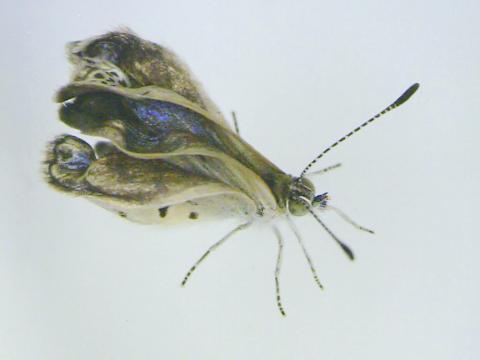Genetic mutations have been found in three generations of butterflies from near Japan’s crippled Fukushima Dai-ichi nuclear plant, scientists said yesterday, raising fears radiation could affect other species.
About 12 percent of pale grass blue butterflies that were exposed to nuclear fallout as larvae immediately after the tsunami-sparked disaster had abnormalities, including smaller wings and damaged eyes, researchers said.
The insects were mated in a laboratory well outside the fallout zone and 18 percent of their offspring displayed similar problems, said Joji Otaki, associate professor at Ryukyu University in Okinawa.

Photo: EPA
That figure rose to 34 percent in the third generation of butterflies, he said, even though one parent from each coupling was from an unaffected population.
The researchers also collected another 240 butterflies in Fukushima in September last year, six months after the disaster. Abnormalities were recorded in 52 percent of their offspring, which was “a dominantly high ratio,” Otaki said.
Otaki said the high ratio could result from both external and internal exposure to radiation, from the atmosphere and in contaminated foodstuffs.
The results of the study were published in Scientific Reports, an online research journal from the publishers of Nature.
Otaki later carried out a comparison test in Okinawa exposing unaffected butterflies to low levels of radiation, with the results showing similar rates of abnormality, he said.
“We have reached the firm conclusion that radiation released from the Fukushima Dai-ichi plant damaged the genes of the butterflies,” Otaki said.
The earthquake-sparked tsunami of March last year knocked out cooling systems at the Fukushima Dai-ichi nuclear power plant, causing three reactors to go into meltdown in the world’s worst atomic disaster for 25 years.
The findings will raise fears over the long-term effects of the leaks on people who were exposed in the days and weeks after the accident, as radiation spread over a large area and forced thousands to evacuate.
There are claims that the effects of nuclear exposure have been observed on successive generations of descendants of people living in Hiroshima and Nagasaki when the US dropped atomic bombs in the final days of World War II.
However, Otaki warned it was too soon to jump to conclusions, saying his team’s results on the Fukushima butterflies could not be directly applied to other species, including humans.
He added he and his colleagues would conduct follow-up studies including similar tests on other animals.
Kunikazu Noguchi, associate professor in radiological protection at Nihon University School of Dentistry, also said more data was needed to determine the impact of the Fukushima accident on animals in general.
“This is just one study,” Noguchi said. “We need more studies to verify the entire picture of the impact on animals.”
Researchers and medical doctors have so far denied that the accident at Fukushima would cause an elevated incidence of cancer or leukemia, diseases that are often associated with radiation exposure.
However, they also noted that long-term medical examination is needed especially due to concerns over thyroid cancer among young people.

MAKING WAVES: China’s maritime militia could become a nontraditional threat in war, clogging up shipping lanes to prevent US or Japanese intervention, a report said About 1,900 Chinese ships flying flags of convenience and fishing vessels that participated in China’s military exercises around Taiwan last month and in January have been listed for monitoring, Coast Guard Administration (CGA) Deputy Director-General Hsieh Ching-chin (謝慶欽) said yesterday. Following amendments to the Commercial Port Act (商港法) and the Law of Ships (船舶法) last month, the CGA can designate possible berthing areas or deny ports of call for vessels suspected of loitering around areas where undersea cables can be accessed, Oceans Affairs Council Minister Kuan Bi-ling (管碧玲) said. The list of suspected ships, originally 300, had risen to about 1,900 as

Japan’s strategic alliance with the US would collapse if Tokyo were to turn away from a conflict in Taiwan, Japanese Prime Minister Sanae Takaichi said yesterday, but distanced herself from previous comments that suggested a possible military response in such an event. Takaichi expressed her latest views on a nationally broadcast TV program late on Monday, where an opposition party leader criticized her for igniting tensions with China with the earlier remarks. Ties between Japan and China have sunk to the worst level in years after Takaichi said in November that a hypothetical Chinese attack on Taiwan could bring about a Japanese

Right-wing political scientist Laura Fernandez on Sunday won Costa Rica’s presidential election by a landslide, after promising to crack down on rising violence linked to the cocaine trade. Fernandez’s nearest rival, economist Alvaro Ramos, conceded defeat as results showed the ruling party far exceeding the threshold of 40 percent needed to avoid a runoff. With 94 percent of polling stations counted, the political heir of outgoing Costa Rican President Rodrigo Chaves had captured 48.3 percent of the vote compared with Ramos’ 33.4 percent, the Supreme Electoral Tribunal said. As soon as the first results were announced, members of Fernandez’s Sovereign People’s Party

MORE RESPONSIBILITY: Draftees would be expected to fight alongside professional soldiers, likely requiring the transformation of some training brigades into combat units The armed forces are to start incorporating new conscripts into combined arms brigades this year to enhance combat readiness, the Executive Yuan’s latest policy report said. The new policy would affect Taiwanese men entering the military for their compulsory service, which was extended to one year under reforms by then-president Tsai Ing-wen (蔡英文) in 2022. The conscripts would be trained to operate machine guns, uncrewed aerial vehicles, anti-tank guided missile launchers and Stinger air defense systems, the report said, adding that the basic training would be lengthened to eight weeks. After basic training, conscripts would be sorted into infantry battalions that would take